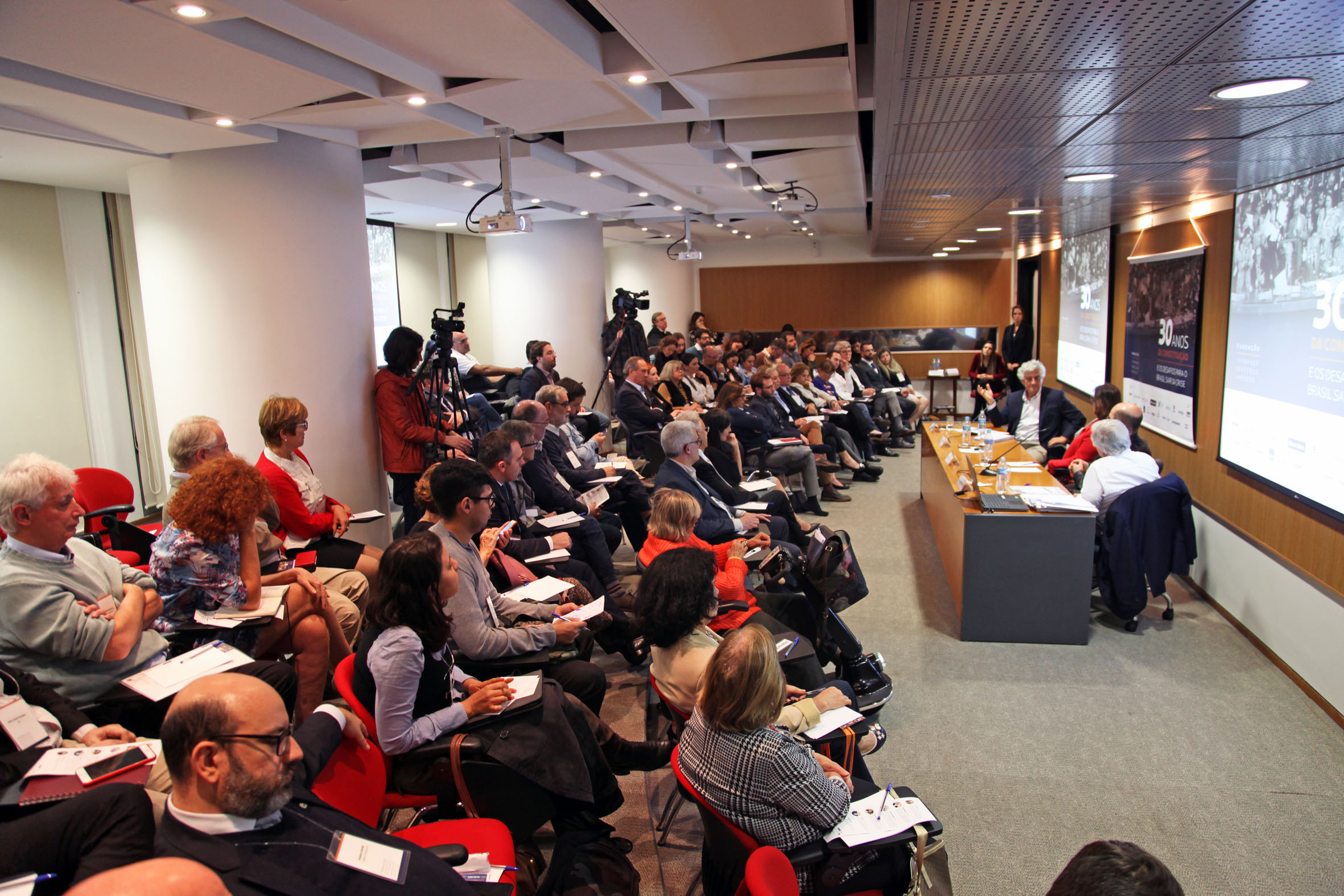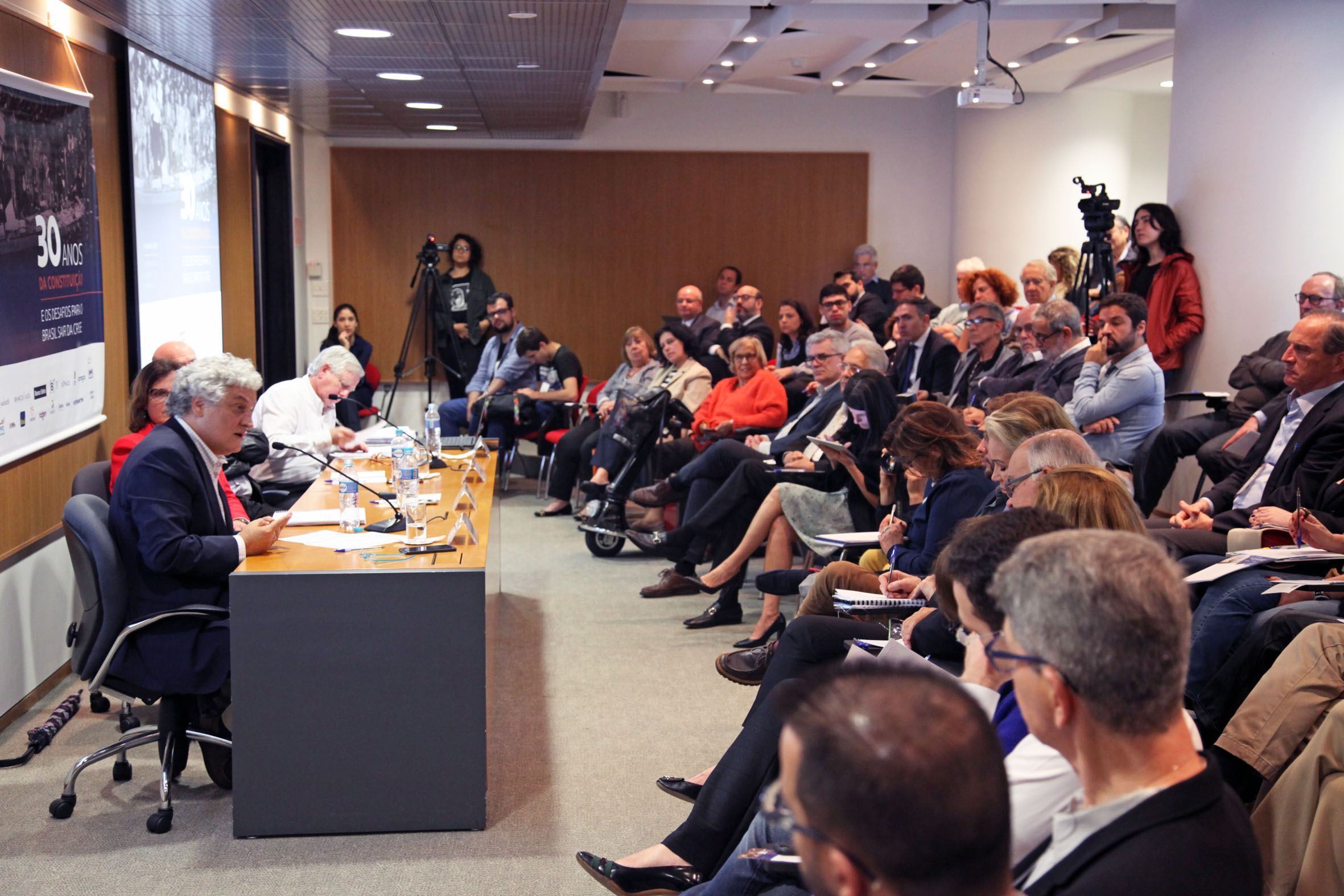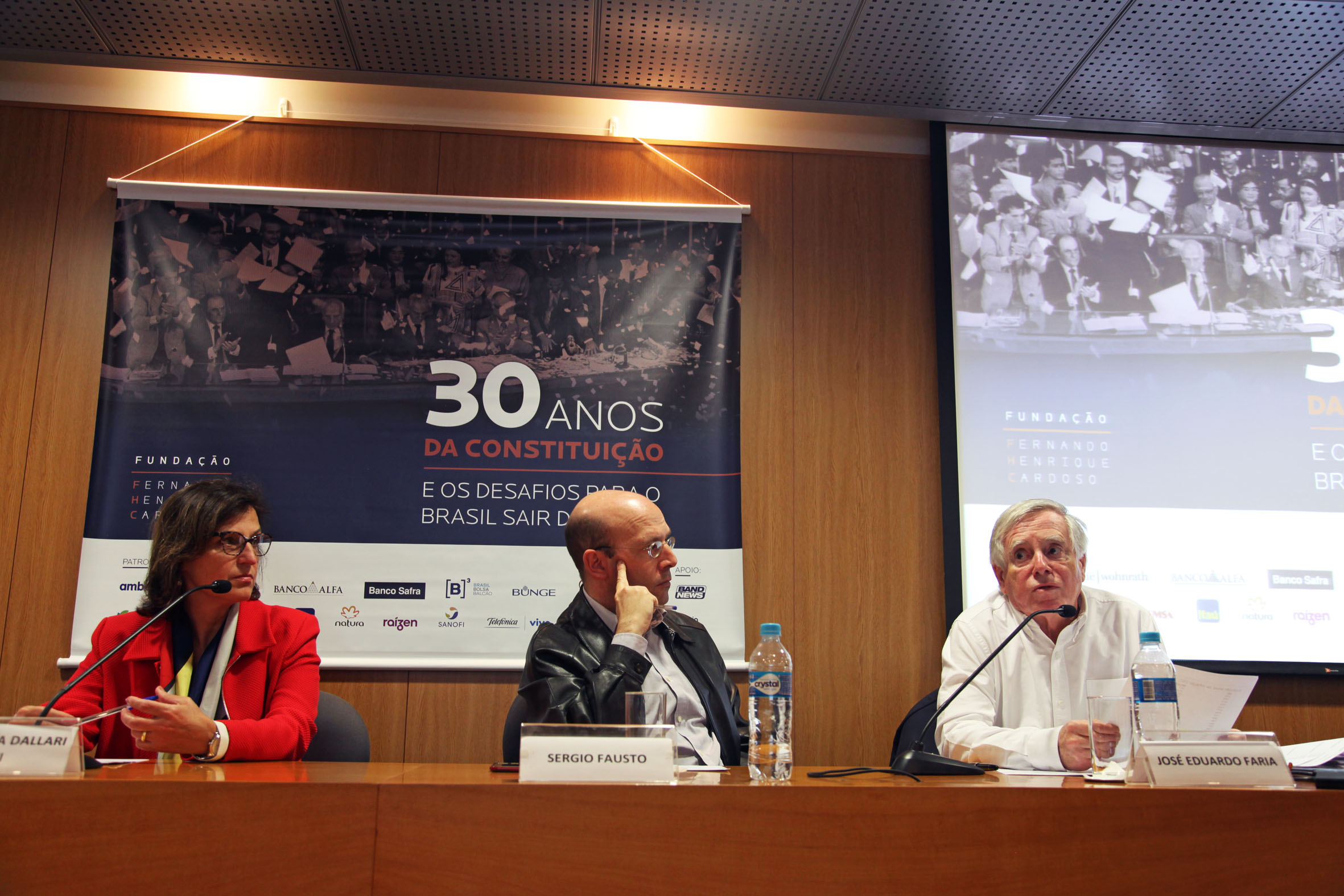Thirty years of the Constitution and the challenges for Brazil to overcome the crisis
“There is no such thing as a citizen budget in Brazil because the rigidity of the expenditures determined in the Constitution practically impedes the (elected) government from making choices. We must urgently face up to the reality that the Brazilian state is exhausted and disseminate the culture of balanced public accounts.”
Ana Paula Vescovi, economist and federal civil servant, is the National Treasury Secretary
“The 1988 Constitution comprises rules with a precise text when there was a consensus among the constituent members, or vaguer principles, when it was not possible to reach an agreement. This is one of its defects and, paradoxically, its virtue.”
José Eduardo Faria, professor of philosophy and general theory of law at the University of São Paulo
“Our charter has democracy in its DNA and, if democracy is not derailed, it will continue to provide the course, as well as the political ballast for the implementation of public policy.”
Maria Paula Dallari Bucci, professor at the University of São Paulo Law School and ex-secretary of Higher Education in the Ministry of Education
“The 1988 Charter’s major quality has been its resilience and capacity for adaptation. The Constitution has two floors, with a rigid nucleus that cannot be altered, while the rest is flexible. Three fifths of the votes in Congress are necessary to amend it. It is not easy, but it has already happened a hundred times.”
Oscar Vilhena Vieira, professor of constitutional law and director of the FGV Law School, São Paulo
“In democratic countries, reforming everything at the same time is not feasible. It is necessary to choose the reforms, which should be incremental. And it is whoever wins the election that makes the choices.”
Fernando Abrucio, political scientist and professor of the FGV Department of Public Administration
“The solution to the fiscal crisis, the main cause of the economic crisis, involves a degree of deconstitutionalization, removing some items from the Charter so that we have greater freedom to make adjustments in the present and in the future. If not, we will be unable to guarantee quality public services for this generation and the following ones.”
Zeina Latif, head economist at XP Investimentos
Reform, yes. With urgency, democratic spirit and respect for the rules of the game. But convening a new constituent assembly to create a new charter at the country’s current conjuncture, with society polarized and the party political system in crisis, would be risky. This was the conclusion of this seminar which comprised three law professors, two economists and a political scientist, on the eve of the 30th anniversary of the 1988 Constitution’s promulgation, on October 5th, two days before the first round of the elections that will determine the course the country will take over the next 4 years.
“Any attempt to draft a new constitution at this moment of uncertainty will end badly. What is still left of the country’s judicial and institutional security will be extinguished”, warned Professor José Eduardo Faria (USP and FGV), author of the books “O Brasil Pós-Constituinte” (Editora Graal) and “Estado e o Direito Depois da Crise” (Editora Saraiva FGV Direito SP).
“Three courses frighten me: a widespread constitutional reform carried out by a group that was not elected (as suggested by a candidate for vice president), because no solution is possible without political debate; the convening of a constituent assembly, which would only increase uncertainty and would not guarantee a better charter than the existing one; and betting on the Federal Supreme Court (Supremo Tribunal Federal) to make changes instead of the elected representatives of the people, because the recent initiatives undertaken by the judiciary have not done the country any good”, said Fernando Abrucio, professor at FGV.

Dialogue with society
“Brazilian society is dissatisfied with the State that we ourselves constructed (since the return to democracy, based on the 1988 Charter). We urgently need leaders in all the spheres of power with the capacity to arbitrate conflicts and find solutions for the country’s serious problems. Only sincere dialogue with society will generate trust. This is democracy”, said National Treasury secretary, Ana Paula Vescovi, a master in public administration (FGV) and specialist in Public Policies and government administration (ENAP-DF).
“The 1988 Charter is frequently criticized for being unrealistic, but it was based on this that the social democratic project was consolidated in the country during the FHC (1995-2002), Lula (2003-2010) and, in part, Dilma (2011-2016) governments. In the last 30 years, there have been important advances in education, in healthcare and in social assistance, with significant results in the reduction of social inequality. There is still a lot of work ahead, but the public policy agenda established by the Constitution was successful and will be very difficult to reverse”, said Maria Paula Dallari Bucci (USP).
Less is not always more
Oscar Vilhena rejected the idea that a leaner Constitution like the North American one, with only seven articles, would be necessarily better than a more robust Charter like Brazil’s, with its 250 articles (originally there were 245).
According to the director of the São Paulo Law School (Escola de Direito de São Paulo), what defines the quality of a constitution is its capacity to ensure that the political game happens based on the exercise of democracy. “The US Constitution, in force since 1789, was elaborated by a group of around 60 white farmers a little over a decade after the declaration of independence. It has undergone few alterations since then (27) and is praised for having contributed to the country’s great development. But it is an exception in the world. All charters created by means of more democratic, participative processes, as was the case of the 1987-1988 Constituent Assembly, have resulted in more robust documents”, the FGV professor stated.
Vilhena mentioned a comparative study about the longevity of constitutions worldwide, conducted by the University of Chicago. Quoting Tom Ginsburg, coauthor of the survey “The Endurance of National Constitutions”, he stated: “we discovered something surprising: the most detailed constitutions are the ones that last longer” . The average lifetime of the 900 compared constitutions is only 19 years. “For a quarter of a century, the Brazilian Constitution served reasonably well as an instrument through which people and political groups with distinct visions of the world and the country competed for power and exercised it democratically”, said Vilhena.
“Whatever was it that happened in recent years (that seems to have put this relatively functional co-existence between political forces at risk)? With its 2006 exclusion of the barrier clause for political parties, that had been approved by the Congress, the Supreme Federal Court made its worst decision in the last 30 years. The proliferation of parties (25 with representatives in Congress) made coalition presidentialism, present in the main European democracies, an impossible game to be played here, resulting, for example, in the Mensalão kickback scandal”, he said.

Vilhena also criticized the fact that the Brazilian electoral districts are very large (the São Paulo state electoral college, for example, has 33 million electors), which has led to a constant and accentuated increase in spending on political campaigns for federal deputy and other positions in recent decades, a situation that is ripe for encouraging corruption, slush funds etc.
Lastly, the constitutionalist raised the point that the State’s constitutional obligation to invest in universalist social policies (education, healthcare etc.) and the dispute between organized groups for chunks of the federal budget generated the distension which has ended up in the current fiscal crisis. “The future of the 1988 Charter depends on us being capable of preserving the tools that enable democracy, which include policies that benefit the whole population, and removing extractivist or regressive instruments that privilege specific groups”, he concluded.
The legislator’s strategy
José Eduardo Faria recalled that the 1988 Constitution was drafted in a country that had just emerged from a long period of dictatorship and in a context of economic disorganization, with low growth and high inflation. Moreover, there was a permanent struggle between parties founded after the return of democracy, in particular the PT, on the one hand, and the parties that joined together in the so-called centrão (center), on the other. “This distrust between the two sides led to the legislators to adopt a strategy of elaborating well defined standards, whenever a consensus was possible, and when it was not, including only deliberately vague principles”, he explained.
“We have never had a constitution so full of principles, which later had to be interpreted by the operators of the law, including the diverse spheres of the Judiciary”, said the University of São Paulo professor. This generated conflicts and legal insecurity, but at the same time enabled a gradual evolution of the Charter. According to Faria, this ongoing interpretation process enabled the emergence of new ways of thinking about the law in Brazil, with greater influence for legal institutions from the Anglo-Saxon tradition, in opposition to our Franco-Roman tradition.

“This trend was made very clear during Penal Suit 470, better known as the Mensalão, when the opinions and votes of ministers more inclined towards Ango-Saxon law, such as the minister Joaquim Barbosa, prevailed”, he stated. According to the professor, this phenomenon was further accentuated more recently in the Lava Jato (Car Wash) operation.
Institutionalization of public policies
According to Maria Paula Dallari Bucci, the 1988 Constitution institutionalized public policies in areas considered essential, such as education, healthcare and social assistance, among others. “The constituents defined targets, federative responsibilities and budgetary allocations This multidimensional and legal feature made a difference in the formulation of some social policies and in the institutional solidity they have assumed since them. This was an important and peculiar tie, creating a ballast that would be very difficult to reverse”, she said.
She mentioned as examples the National Education Plans I and II and the SUS (Single Healthcare System). According to Paula, public security was not positioned at the same level, receiving only a superficial mention in the Constitution, which, in part, would explain the non-existence of a national policy in the security area. “Only recently have authorities made more significant efforts to create a single public security system”, she stated.
More sustainable federalism
Fernando Abrucio (FGV) advocated that the reforms to be undertaken in the coming months and years should be sustained by a review of the federative pact and a fiscal adjustment associated with improved performance on the part of the State. “An adjustment without better performance is not possible, because the people want healthcare, education and other quality services. On the other hand, without better collaboration between federative bodies, we will not be able to develop the policies that society demands. It is fundamental to make Brazilian federalism more sustainable, because the majority of the states and municipalities are broke”, he said.
“The reform of the State should take place in two dimensions: on the one hand, a careful fiscal adjustment that ensures financial health in the medium and long term; on the other performance with democracy”, he said. Abrucio also used public security as an example of policy that needs to be improved. “What we have today is an uncoordinated public security system. The PCC has invaded the country’s Northeast, which is experiencing an epidemic of violence. A correct design for a essencial area of peoples’ lives is lacking”, he stated.
Meritocracy
Zeina Latif, with broad experience in the financial sector, said that the development of the notion of budgetary restriction in society is fundamental, because that is the only way to deliver essential public services. “What we see today, with the imbalance in spending, is a lack of commitment to the future generations. The way things are going, young people will have no prospects”, she claimed.

According to the economist, meritocracy needs urgently to be introduced into public administration. “Why don’t we establish a merit-based rule for constitutional federal fund transfers to the states and municipalities? Those presenting the greatest advances in education, for example, should be rewarded with higher funding”, she proposed.
‘Society will not accept the return of inflation’
The last to speak, Ana Paula Vescovi warned that if the Brazilian fiscal deficit is not reversed in the medium term (“intending to do this in one or two years is unrealistic”), the consequence will be the explosion of public debt, an increase in interest rates and the return of inflation, with low economic growth and high unemployment.
“Society doesn’t admit high inflation and its extremely harmful consequences anymore. If this happens, there will be social convulsion”, she claimed. In 2018, the federal government is projecting a primary deficit (before payment of interest on the national debt) of around R$ 150 billion. The target for 2019 is to reduce it to R$ 140 billion, which will depend on the actions of the next federal and state governments.
Vescovi, who worked for ten years in the Finance Ministry’s Economic Policy Secretariat, advocated a number of measures to enable the country to adopt a more sustainable course, which would require a fiscal adjustment of approximately 4.5% of GDP:
- Social Security Reform
“It should be based on sustainability and equity-related criteria”; - Consolidation of the ceiling for expenditures (included in the Constitution in 2016)
“It is a measure that has been unfairly attacked, because it is already forcing an essential discussion within the government about where and how to allocate the available funds”; - Correct prioritization
With limited resources, it is necessary to prioritize, establish targets and verify results. As an example of “inside out prioritization”, Vescovi cited the large increase in funding for higher education in recent years, while basic and secondary education still need to improve very much. “Between 2004 and 2014, the Ministry of Education invested more than R$ 120 billion in higher education. Many federal universities were created and around 100,000 university teachers were hired, and this is irreversible. Meanwhile, nothing has been done about making schools full-time, which would cost around R$ 7 billion. It is a clear example of starting to build a house from the roof down.”
The Treasury secretary defended the maintenance of some economic advances made by the Temer government, of which she is part: “There is still much to do, but inflation (which was over 10% in 2015) is under control (around 4%) and the interest rate has dropped greatly (from 14.25% in 2016 to 6.5% now). Two factors which, if maintained in the coming years, will benefit everyone. Responsibility in public accounts is something that has a positive effect on society as a whole”, she affirmed.
Lack of leadership
According to former president Fernando Henrique Cardoso, it is up to the president (in effect, whoever is elected in October) to convince the population of the seriousness of the country’s situation and the efforts that need to be made to overcome it. “Saying it is easy, doing it is difficult. It will require a great deal of leadership, because the reforms that are necessary will not produce immediate results. However, it is important that the population feels some kind of relief in their day to day lives, if not the political support for the government that is elected will not be sustained”, he stated.
“The country’s agenda is set by the Executive and will only pass in the Congress if the president embodies the changes and wins the support of society, including the majority of the population, the business community, the unions, the churches and other sectors. If he does not know how to communicate clearly and in a convincing manner, the president is lost”, said FHC, who was a constituent and led the Real Plan (which stabilized the country’s economy in the 1990s).
Otávio Dias, journalist, is specialized in politics and international affairs. He was the correspondent for the Folha in London, editor of the estadão.com.br website and chief editor of the Huffington Post in Brazil.
Translated by Raymond Maddock. Revised by Beatriz Kipnis.




